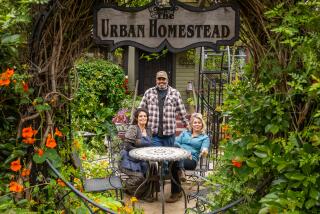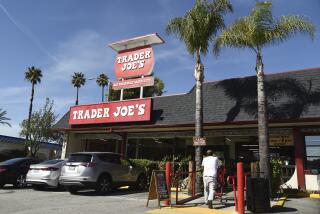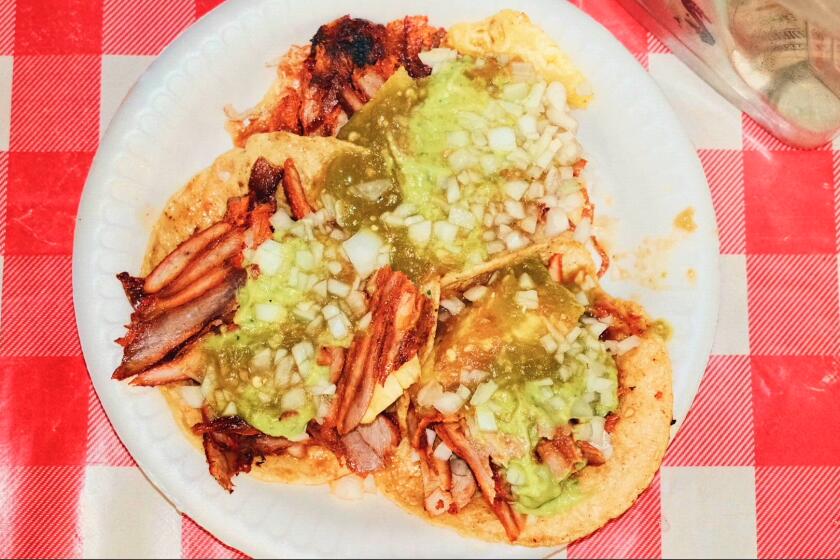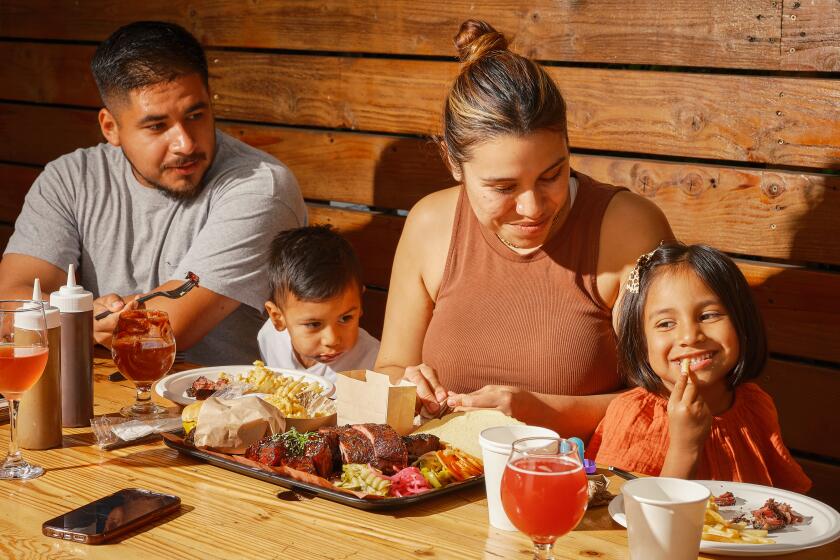Market Watch: What else do those produce boxes hold?
For several decades, certified farmers markets have been the primary business model to satisfy the growing demand for fresh, locally grown produce, but in the last several years, an alternative model, community-supported agriculture (CSA), has spread rapidly in Southern California. The consequences for consumers, growers and farmers markets seem mostly positive so far, but the potential for controversy is also starting to emerge.
The CSA concept, which began in Europe and Japan in the 1960s and took root in the United States in the 1980s, calls for consumers to buy a share in the production of a farm and receive a box of produce in return. Many variations exist: in the size of the box (for one to six people), the frequency of shipments (typically weekly), the duration of the plan (monthly, seasonally, yearly) and whether the farm buys from or links up with other growers to diversify its offerings (a vegetable farm often supplements with fruit, for example). Most CSAs drop off the boxes on set days at locations such as schools, businesses and farmers markets, but some deliver directly to homes.
Many consumers are attracted by the direct connection to a particular farm and its growing practices; to encourage this link, most CSAs offer farm visits and tours to their members. The CSA box can also be convenient to those who lack time to shop at farmers markets. Vendors say that their prices are about the same or a little lower for CSA shipments compared with farmers market sales, and definitely lower than for equivalent items at supermarkets.
On the other hand, to the extent that they no longer shop at farmers markets, CSA customers miss out on socializing with other shoppers and farmers, which is a major attraction for many market-goers. In addition, the CSA model limits choice, since CSAs usually provide a set box of what’s in season on their farm.
Many CSA customers actually “don’t want the choice,” says Suzannah Underwood of Underwood Family Farms, which grows vegetables and berries in Somis and Moorpark and has been a longtime mainstay at farmers markets. “They like being given new items and having to work with them.”
The Underwood farm started a CSA in October 2008 and now provides 200 boxes a week, to 14 collection sites, says Underwood, a daughter of Craig Underwood, the farmer. Most of them are in Ventura County, she added, but the CSA program has grown tremendously in the last six months, and the farm is negotiating with a chain of markets in the Los Angeles area to serve as dropoff points.
Underwood practices what it calls “sustainable agriculture,” but another well-respected vegetable and berry grower that is certified organic, McGrath Family Farm of Camarillo, is starting its fourth year of offering a CSA, says Havilah McGrath, a niece of farmer Phil McGrath. The farm, which had about 120 CSA customers last year, drops off at four locations in Ventura County and Los Angeles.
The CSA component, while growing rapidly, still accounts for just a small percentage of the sales of these two farms. But for J.R. Organics, a fourth-generation farm that cultivates 60 acres in Escondido, the 3-year-old CSA comprises 30% of sales, compared with 40% at farmers markets and 30% to wholesale, says Joe Rodriguez Jr.
When customers pick up their CSA box at a farmers market, the farm pays a fee to the market management, typically 4% to 10%, just as it does for other farmers market sales.
At the Mar Vista farmers market, one of the three certified markets in the Los Angeles area to which J.R. delivers CSA boxes, the manager, Diana Rodgers, has mixed feelings about the effect on her market.
“The overall purpose of a CSA is great,” says Rodgers, who recently started selling through a CSA herself as a flower farmer in Northern California, where she lives part time. “I feel like J.R. makes a great contribution to the market, and if it is helpful to people who are too busy to come walking through the market and would rather pick up a box, then it’s OK with me. But I think it’s maybe not the best thing for all of the other farmers at the market, unless they’re being included.”
The dynamic becomes particularly tricky when a farm sells at farmers markets and offers a home delivery service too, as does Capay Organic, which operates a large CSA called Farm Fresh to You. Mary Lou Weiss, manager of the Torrance farmers market, likes the farm and its produce but forbids it to post signs and distribute brochures promoting its CSA.
“I told them, ‘I didn’t bring you here to take my customers away,’ ” she says.
Making a profit seems to be a primary motive for some recent entrants in the CSA field, but the South Central Farmers’ Cooperative, which farms 120 acres in Shafter, near Bakersfield, focuses on social objectives. The farm offers its CSA shareholders price options for the same box: from $15 for those of modest means to $40 for others who can afford it and wish to subsidize the distribution of a box to a needy family, says Tezozomoc, the farm’s manager, who goes by one name.
One of the biggest attractions for some farmers who have shifted to CSAs is that they are still largely unregulated. “Farmers markets are a very political environment, and we got sick of it,” says one grower in Northern California who did not want to be identified so as to avoid unwanted scrutiny. “At a farmers market, someone else [such as managers and market boards] holds a lot of power over my ability to earn. With a CSA it’s more straightforward: If I do a good job, I can measure it by the high retention rate of my customers.”
This unregulated aspect concerns Karen Wetzel Schott, manager of Ventura County Certified Farmers’ Markets which runs four markets in Ventura, Thousand Oaks and Santa Clarita. She is unhappy that Abundant Harvest Organics a service that sources produce from more than a dozen farms, mostly in the San Joaquin Valley, drops off at the Santa Clarita location, on Saturdays, the day before her market.
“They’re making profit off of our market, and it’s quite detrimental to us,” she says. “It’s one thing when a consumer buys directly from one farm though a CSA — that’s fabulous — but when an organization gathers produce from many sources, how do people know where that produce really comes from, or whether it’s organic? They’re totally under the radar of all the regulatory agencies that we have to deal with at a farmers market.”
Responding to these comments, Vernon Peterson, the owner of Abundant Harvest, says: “We work with some farmers markets, and for the most part they really appreciate us there, because we bring additional foot traffic. We only purchase from farmers who are certified organic, and we provide a list of these sources, and their e-mail addresses, on each newsletter that we send to subscribers. Customers can contact the farmer directly — it’s a wonderful process that unites the co-producers with the producer.”
More to Read
Eat your way across L.A.
Get our weekly Tasting Notes newsletter for reviews, news and more.
You may occasionally receive promotional content from the Los Angeles Times.










